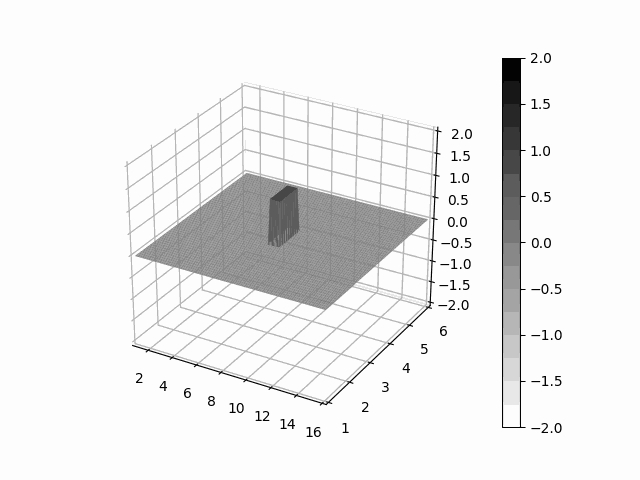
Research
Malicious npm Packages Impersonate Flashbots SDKs, Targeting Ethereum Wallet Credentials
Four npm packages disguised as cryptographic tools steal developer credentials and send them to attacker-controlled Telegram infrastructure.
Leibniz: a package providing facilities to express learnable differential equations based on PyTorch
Leibniz is a python package which provide facilities to express learnable differential equations with PyTorch
We also provide UNet, ResUNet and their variations, especially the Hyperbolic blocks for ResUNet.
pip install leibniz
As an example we solve a very simple advection problem, a box-shaped material transported by a constant steady wind.

import torch as th
import leibniz as lbnz
from leibniz.core3d.gridsys.regular3 import RegularGrid
from leibniz.diffeq import odeint as odeint
def binary(tensor):
return th.where(tensor > lbnz.zero, lbnz.one, lbnz.zero)
# setup grid system
lbnz.bind(RegularGrid(
basis='x,y,z',
W=51, L=151, H=51,
east=16.0, west=1.0,
north=6.0, south=1.0,
upper=6.0, lower=1.0
))
lbnz.use('x,y,z') # use xyz coordinate
# giving a material field as a box
fld = binary((lbnz.x - 8) * (9 - lbnz.x)) * \
binary((lbnz.y - 3) * (4 - lbnz.y)) * \
binary((lbnz.z - 3) * (4 - lbnz.z))
# construct a constant steady wind
wind = lbnz.one, lbnz.zero, lbnz.zero
# transport value by wind
def derivitive(t, clouds):
return - lbnz.upwind(wind, clouds)
# integrate the system with rk4
pred = odeint(derivitive, fld, th.arange(0, 7, 1 / 100), method='rk4')
from leibniz.unet import UNet
from leibniz.nn.layer.hyperbolic import HyperBottleneck
from leibniz.nn.activation import CappingRelu
unet = UNet(6, 1, normalizor='batch', spatial=(32, 64), layers=5, ratio=-1,
vblks=[4, 4, 4, 4, 4], hblks=[1, 1, 1, 1, 1],
scales=[-1, -1, -1, -1, -1], factors=[1, 1, 1, 1, 1],
block=HyperBottleneck, relu=CappingRelu(), final_normalized=False)
We provide a ResUNet implementation, which is a UNet variation can insert ResNet blocks between layers. The supported ResNet blocks are include
We support 1d, 2d, 3d UNet.
normalizor are include:
Other hyperparameters are include:
Piecewise Linear normalizor provide an learnable monotonic peicewise linear functions and its inverse fucntion. The API is shown as below
from leibniz.nn.normalizor import PWLNormalizor
# on 3 channels, given 128 segmented pieces, and assuming the input data have a zero mean and 1.0 std
pwln = PWLNormalizor(3, 128, mean=0.0, std=1.0)
normed = pwln(input)
output = pwln.inverse(normed)
python3 setup.py sdist bdist_wheel
python3 -m twine upload dist/*
git tag va.b.c master
git push origin va.b.c
We included source code with minor changes from torchdiffeq by Ricky Chen, because of two purpose:
All our contribution is based on Ricky's Neural ODE paper (NIPS 2018) and his package.
FAQs
Leibniz: a package providing facilities to express learnable differential equations based on PyTorch
We found that leibniz demonstrated a healthy version release cadence and project activity because the last version was released less than a year ago. It has 1 open source maintainer collaborating on the project.
Did you know?

Socket for GitHub automatically highlights issues in each pull request and monitors the health of all your open source dependencies. Discover the contents of your packages and block harmful activity before you install or update your dependencies.

Research
Four npm packages disguised as cryptographic tools steal developer credentials and send them to attacker-controlled Telegram infrastructure.

Security News
Ruby maintainers from Bundler and rbenv teams are building rv to bring Python uv's speed and unified tooling approach to Ruby development.

Security News
Following last week’s supply chain attack, Nx published findings on the GitHub Actions exploit and moved npm publishing to Trusted Publishers.